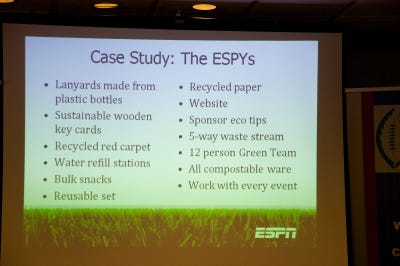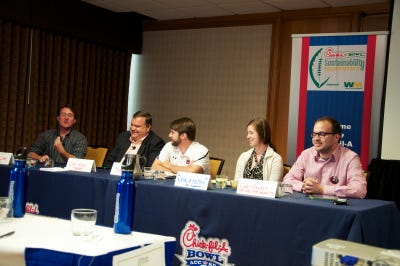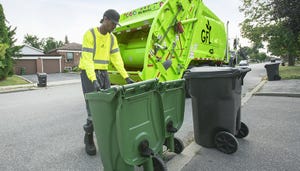Campus Green
Chick-Fil-A Bowl Sustainability Summit seeks to green college campuses.
In June, a unique assemblage gathered for a two-day summit at the Omni CNN Hotel in Atlanta. Billed as the Chick-Fil-A Bowl Sustainability Summit and co-sponsored by Chick-Fil-A Bowl organizers and Waste Management, the second annual event drew sustainability directors, waste coordinators, grounds management personnel, athletic staff and other representatives from colleges and universities around the country. There they met with waste services and sustainability professionals, including representatives from Waste Management and the U.S. Environmental Protection Agency, the Georgia World Congress Center Authority, Coca-Cola Recycling and HaglerHomrich Consulting Group to share best practices and discuss ways that collegiate athletic programs and schools in general can better address waste minimization, recycling, energy conservation and sustainability.
 The first day of the conference was dedicated primarily to waste reduction and recycling. ESPN Global Sustainability Director Fabian DeGarbo gave a presentation detailing his company’s sustainability efforts at its Bristol, Conn., headquarters (where it has achieved 70 percent diversion) and at the various events it owns and covers, including College Game Day, the X Games and the ESPY Awards. For example, the company recruits student volunteers at each college it visits to collect recyclables following the raucous College GameDay broadcasts each autumn Saturday. He also detailed the sustainable practices that have led ESPN to dub the ESPY Awards “the greenest event in broadcasting.”
The first day of the conference was dedicated primarily to waste reduction and recycling. ESPN Global Sustainability Director Fabian DeGarbo gave a presentation detailing his company’s sustainability efforts at its Bristol, Conn., headquarters (where it has achieved 70 percent diversion) and at the various events it owns and covers, including College Game Day, the X Games and the ESPY Awards. For example, the company recruits student volunteers at each college it visits to collect recyclables following the raucous College GameDay broadcasts each autumn Saturday. He also detailed the sustainable practices that have led ESPN to dub the ESPY Awards “the greenest event in broadcasting.”
A panel discussion focused on sustainability in college athletics featured a large contingent from Auburn University, as well as Ohio State University (OSU) and the University of North Carolina at Chapel Hill. Much of the discussion focused on best practices for engaging coaches, athletic departments, and stadium operations personnel in the daunting task of helping to establish recycling programs and other green practices.
 A series of case studies addressed sustainable materials management at several different universities. Corey Hawkey, sustainability coordinator for OSU, detailed Ohio Stadium’s highly successful zero waste program, which as of the 2011 football season was yielding more than a 75 percent diversion rate. Hawkey also highlighted some other successful college sustainability programs around the country, paying special homage to Colorado University, which has a fully functioning materials recovery facility underneath its stadium staffed by volunteers that sort every piece of stadium trash.
A series of case studies addressed sustainable materials management at several different universities. Corey Hawkey, sustainability coordinator for OSU, detailed Ohio Stadium’s highly successful zero waste program, which as of the 2011 football season was yielding more than a 75 percent diversion rate. Hawkey also highlighted some other successful college sustainability programs around the country, paying special homage to Colorado University, which has a fully functioning materials recovery facility underneath its stadium staffed by volunteers that sort every piece of stadium trash.
The second day of the summit was comprised primarily of case studies and presentations focused on energy and water conservation and sustainable procurement.
Organizers said they hope future iterations of the sustainability summit feature more of a roundtable dialogue as opposed to the current relative one-way format of presentations, case studies and panels followed by Q&As. Even so, the event was host to some enthusiastic and collaborative discussion, and it was easy to get the sense that many of the school delegations left with new ideas for practical sustainability initiatives in hand.
About the Author(s)
You May Also Like


